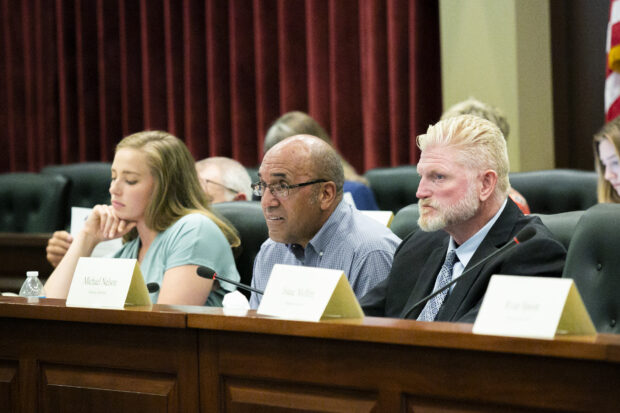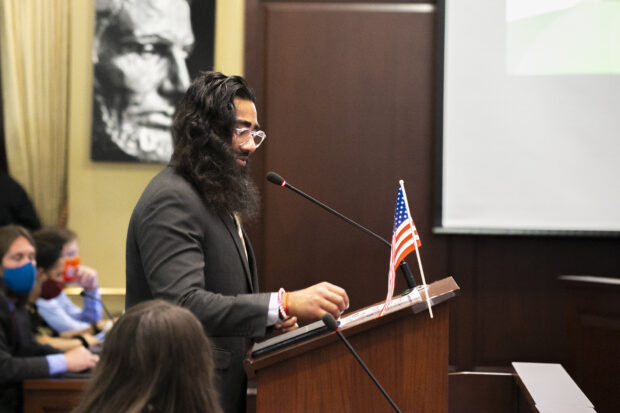
Members and presenters at Lt. Gov. Janice McGeachin’s education indoctrination task force Thursday decried Marxist teachings and alleged leftist educational practices in higher education, as they shifted focus to colleges and universities.
The third of the task force’s four scheduled meetings was again dominated by concerns about leftist teachings. The committee again accepted no live public testimony and did not hear from state education agencies’ key players — who either declined invitations or said they were unable to participate. The meeting departed from past practice in ways too, hosting one presenter who opposed banning critical race theory from schools, and lacking tense exchanges between McGeachin and protesters.
That’s not to say the meeting was quiet.
McGeachin-backing audience members thrice loudly applauded Trevor Loudon, a conservative commentator from New Zealand who the Southern Poverty Law Center described as “a far-right conspiracy theorist” who is “known for seeing communist infiltrators everywhere and claims the political left are working with so-called Islamists to overthrow the United States.”
He roused murmurs of support as he criticized Marxism and the way the “Chinese government is directly influencing education at every level in this country,” and said, raising a claim debunked by Axios and PolitiFact, that Black Lives Matter “is a front for a pro-Chinese communist group.”
“It should really be called Marxist critical race theory,” Loudon said of the academic movement that a bloc of U.S. and Idaho conservatives has targeted over at least the past year.
‘Point-counterpoint’
Earlier, Boise State University social work professor Nafees Alam offered what was, as he put it, “somewhat of a dissenting opinion.”
He presented on a point-counterpoint teaching philosophy, in which he argued for “intellectual diversity,” that a wide range of opposing opinions should be allowed to coexist in the classroom. His talk — supporting more ideas in the classroom and opposing censorship categorically — included saying that critical race theory should be allowed to be taught in conjunction with conflicting theories.
Amid a line of sometimes critical questions about Alam’s approach from fellow task force members, Anna Miller of the Idaho Freedom Foundation accused him of advancing the view that white people should be enslaved. When he said he hadn’t done so, Miller said, “We have the video,” saying one of Alam’s students had sent her one.

The conservative group, tweeted a link to the video, in which Alam appears to say that a strict eye-for-an-eye logic would result in enslavement of white people to rectify past wrongs.
“I’m not going to ask you to raise your hand or if you agree with that. I can’t imagine many hands going up,” he appears to say. “I feel like you know me well enough to know where I stand on these topics, but do understand that there are people who will be saying these things, fully meaning it.”
The video was posted in April before the task force had been formed. McGeachin didn’t specifically comment on why Alam had been chosen to speak.
Politics resurface
Task force members, Loudon and McGeachin all made political references to the State Board of Education. The board is considering a campus diversity and inclusion policy, denies indoctrination claims and has declined or been unavailable to accept invitations to speak at the last two meetings.
Task force member Ryan Spoon asked McGeachin if the State Board could be dissolved. “I couldn’t say whether we could do without them, at this point because I see that they have a lot of responsibility on their hands,” McGeachin said.
On multiple occasions, participants noted that the governor appoints State Board members — all while McGeachin runs for Idaho’s top office.
Inviting Loudon to stay in Idaho, McGeachin told him, “We could appoint you to the State Board of Education,” with a laugh.
The race for state superintendent of public instruction was again drawn into the mix, too. McGeachin made thinly veiled references to State Board member and superintendent candidate Debbie Critchfield, who is running as a Republican in 2022, calling on potential voters to press Critchfield on her stance on school indoctrination. McGeachin said an unnamed State Board member who is running — the only such person is Critchfield — was asked to present but declined after a “respectful dialogue.”
The search continues
And while the discussion of indoctrination, political or not, pivoted to higher education, K-12 schools started in the spotlight. Task force member Elaine King presented results from a survey conducted via Facebook meant to elicit responses from second- through eighth-graders; the “National Education Guardians,” a Facebook page that conducted the survey, has under 80 followers as of Thursday night.
Higher education remained the focus, though. A former North Idaho College student spoke in a video about what he saw as partisan teaching from a professor, and a McGeachin intern presented on professor accreditation. And colleges and universities, where Idaho’s indoctrinating debate started in 2019, were again scrutinized.
Most of the task force’s next meeting in August will be devoted to hearing live public testimony, McGeachin said. It would be the first time comment is accepted at a meeting.
In the meantime, her co-chair Rep. Priscilla Giddings, R-White Bird, told task force members she’d submit any policy proposals they’d like to make to the Legislative Services Office to turn into draft legislation.
Proposals will likely be posted to the lieutenant governor’s website within seven days of the meeting, McGeachin said.
For full play-by-play, coverage and fact checking, read the EdNews blog from Thursday’s meeting.
Idaho Education News reporters Kevin Richert and Sami Edge contributed to this report.
